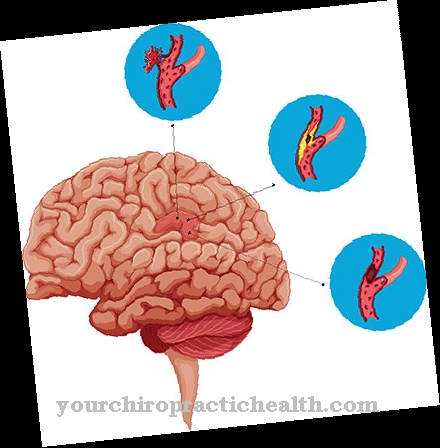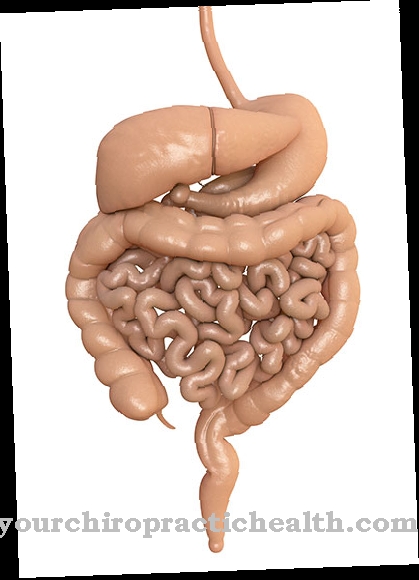A Mesenteric infarction describes the acute occlusion of an intestinal vessel which, if left untreated, leads to the death of intestinal sections. It is a life-threatening clinical picture that is often recognized too late and has a high mortality rate. It usually affects patients with previous cardiovascular diseases.
What is a mesenteric infarction?

© sakurra - stock.adobe.com
At the Mesenteric infarction If an intestinal vessel is blocked by an embolism or thrombosis, both intestinal arteries and intestinal veins can be affected.
The intestine in the supply area of the affected vessel is no longer adequately supplied with blood, so that - without timely countermeasures - the tissue dies (infarction and necrotization). In the case of arterial mesenteric infarction, the superior mesenteric artery ("upper intestinal artery"), which supplies large parts of the small intestine, large intestine and pancreas, is affected in 85 percent of cases.
The remaining 15 percent are roughly equal to the celiac trunk ("abdominal cavity trunk"), in whose supply area lies the duodenum in addition to the stomach, liver, spleen and pancreas, and to the inferior mesenteric artery ("lower intestinal artery"), the descending one Colon and upper rectum nourished. A mesenteric infarction of the inferior mesenteric artery has a better prognosis.
causes
The cause of one Mesenteric infarction lies in either an embolism or a thrombosis. Embolism typically occurs in middle-aged patients.
Pre-existing cardiac diseases such as cardiac arrhythmias or artificial heart valves promote the development of an embolus in the heart, which is first carried into the aorta and then into the intestinal vessels. Thromboses in the mesenteric arteries are more likely to develop in older patients due to arteriosclerosis.
The vascular wall thickens due to fat deposits, connective tissue growths and inflammatory processes, until adequate blood flow is no longer possible. Mesenteric vein thrombosis is more rarely responsible for mesenteric infarction. It is usually preceded by an underlying disease that promotes thrombosis, e.g. B. a local inflammation, a sepsis or a coagulation disorder.
Symptoms, ailments & signs
A mesenteric infarction is an extremely life-threatening condition. The disease generally has three phases. In phase I, severe abdominal pain suddenly occurs, which is particularly concentrated in the area around the navel. But there are no defensive tensions and pressure pain. In addition to the colicky abdominal complaints, bloody diarrhea and symptoms of circulatory shock often occur.
As a result of a circulatory disorder in the intestine caused by an embolism or a thrombosis, the sections of the intestine affected by the obstruction die. Your necrosis begins about two hours after the vascular occlusion due to the insufficient supply of the corresponding intestinal sections. When examining the abdomen, nothing is initially noticed.
However, increasing deterioration of the patient is observed. About six to eight hours after the start of the initial phase, the pain suddenly disappears and the patient appears to be feeling better. Sometimes this so-called "treacherous peace" is accompanied by meteorism and gas. This apparent improvement in symptoms is due to the decrease in intestinal peristalsis, which is also caused by the inadequate supply of the intestine.
Phase II with the apparent calming of the symptoms is then replaced by phase III with irreparable necrosis of large sections of the intestine. This initially leads to a [(intestinal paralysis]], which prevents the intestinal contents from being passed on. The result is paralytic intestinal obstruction, rupture of the intestine with formation of peritonitis and severe intoxication of the body. The mortality is up to 90 percent.
Diagnosis & course
A Mesenteric infarction Classically runs in 3 stages. The main symptom in the initial stage is an acute abdomen: a sudden, severe, colicky stomach pain.
Defense tension is often initially absent. Unfortunately, the acute abdomen is a relatively unspecific sign that can have many causes. As a result, the emergency diagnosis is often not made quickly enough. In addition, the pain subsides after a few hours due to the drying up of the intestinal peristalsis and an apparent improvement begins.
This second phase is known as “lazy peace”. A blood gas test provides important information (metabolic acidosis, lactic acidosis). Elevated white blood cell counts indicate inflammatory processes. The mesenteric infarction can be visualized using an X-ray overview of the abdomen, sonography and / or CT angiography.
If the mesenteric infarction is not diagnosed in time, the patient's condition worsens massively after about 12 hours due to advanced intestinal necrosis. The end stage begins: the patient gets into septic shock with intestinal obstruction (ileus) and peritonitis (peritonitis). If left untreated, mesenteric infarction is a sure death sentence.
Complications
In the worst case, the mesenteric infarction can lead to death of the patient. However, this complication usually only occurs if the mesenteric infarction is not treated. Those affected suffer from very severe pain in the stomach and intestines, which leads to significant restrictions in the quality of life.
It is also not uncommon for diarrhea and a tense stomach to occur. The patient's resilience decreases and fatigue often occurs. It is not uncommon for the mesenteric infarction to lead to a decreased appetite and thus to deficiency symptoms. Due to the constant pain, many patients also suffer from depression and psychological complaints or moods.
In the case of mesenteric infarction, direct surgery is necessary to avoid consequential damage and death of the person concerned. This usually has to occur a few hours after the onset of the mesenteric infarction. In most cases there are no complications, but dead parts of the intestine must be removed.
After the procedure, in most cases there is a large scar on the abdomen. As a rule, it cannot be predicted whether life expectancy will be reduced by the mesenteric infarction.
When should you go to the doctor?
If the person concerned suffers from complaints in the abdominal region, there is a health impairment. If there is persistent or increasing abdominal or abdominal pain, a doctor should be consulted. If you experience severe symptoms suddenly, you should see a doctor as soon as possible. If colic occurs, the person affected or those present should alert an ambulance service. Since a mesenteric infarction can, in the worst case, lead to a fatal course of the disease, an immediate consultation with an emergency doctor is necessary. The instructions of the emergency doctor must be followed to ensure the survival of the person concerned.
A repeated or increasing diarrhea should be checked by a doctor. Abdominal muscle disorders or irregularities indicate a worrying irregularity. A visit to a doctor is advisable so that a diagnosis can be made. If the bowel becomes blocked, if the usual level of performance continues to decline, or if the person concerned experiences a general feeling of illness, they need medical help. Restlessness, changes in body temperature, and general malaise are signs of an existing illness that should be treated. A breakdown in strength or an inability to carry out everyday duties are symptoms that should be discussed with a doctor.
Treatment & Therapy
Of the Mesenteric infarction is an internal emergency and requires quick action. Intestinal necrosis can occur as early as 2 hours after the onset of the infarction.
The affected intestinal tissue can only be saved if an early operation allows the vessels to pass through again. The operation requires a large abdominal incision and is known as a laparatomy with (attempted) embolectomy. If the tissue is already irreversibly damaged, the dead intestinal parts must be removed. Often around 12 hours after a successful first operation, a so-called second look operation is carried out in order to resect any further necrosis.
Postoperative care must counteract sepsis and peritonitis as well as other thromboses. Mesenteric infarction has an unfavorable prognosis, especially because of the short time window for a promising therapy. On average, the lethality of mesenteric infarction is 90%. Operated patients have a 50% chance of survival.
You can find your medication here
➔ Medicines for stomach ailments and painOutlook & forecast
In a large number of patients, the prognosis for a mesenteric infarction is poor. It is a life-threatening condition that greatly increases the risk of the patient's premature death. The disease has three stages. In most cases, the diagnosis and adequate medical care are made very late. This has a negative effect on the further course of the disease and thus the prognosis.
In addition, many of the patients suffer from other pre-existing conditions. These mostly relate to the cardiovascular area and thus cause an increase in the existing symptoms. If the person concerned refuses medical care, this inevitably leads to a critical condition and ultimately to the death of the person concerned. Extreme caution is also required when seeking medical treatment. Irreversible damage and death can occur within a few hours.
Patients who received timely and comprehensive care have improved prospects. If there are no other primary diseases, there are definitely prospects of recovery despite the critical condition. However, it must be taken into account that most patients with a mesenteric infarction suffer from various pre-existing cardiovascular diseases. As a result, almost half of all those affected die prematurely even after a successful operation.
prevention
The prevention of one Mesenteric infarction On the one hand, there are measures that generally prevent arteriosclerosis: avoiding cigarettes, eating a healthy diet with healthy fats, and getting enough exercise. On the other hand, thrombosis prophylaxis with anticoagulants is important for high-risk patients, especially for elderly heart patients. Beyond prevention, it is crucial to think of the possible diagnosis of mesenteric infarction, especially with these risk patients, in an emergency, in order not to let any saving time pass by.
Aftercare
Follow-up care for a mesenteric infarction depends primarily on the cause. The patient should decide this individually with his treating doctor. Each patient should also discuss with their family doctor whether certain dietary changes should be taken into account. In addition, symptoms such as frequent heartburn, stabbing stomach pains or vomiting blood must be linked to the previous history and clarified in the future. Sufferers should follow a healthy lifestyle that reduces the likelihood of recurrence. A balanced diet and sufficient exercise are essential.
You can do that yourself
As a rule, a mesenteric infarction cannot be combated with various self-help treatments. In the case of this disease, it is essential to see a doctor in order to avoid complications or, in the worst case, death of the person affected.
In acute emergencies in particular, you should go to the hospital directly or call an emergency doctor. This is the case if the person concerned suffers from excessive tension in the abdomen or from an intestinal obstruction. These complaints are accompanied by severe pain. The treatment of mesenteric infarction is always carried out in a hospital by an operative procedure and usually leads to success if the procedure is carried out early. A second operation is often necessary to avoid further necrosis.
Mesenteric infarction can be avoided through a healthy lifestyle.This includes a healthy diet and exercise. Refraining from alcohol and cigarettes also has a positive effect on the disease. Patients at risk should take part in regular examinations to avoid a mesenteric infarction. Successful treatment usually does not lead to a reduced life expectancy for the patient.


.jpg)










.jpg)

.jpg)
.jpg)











.jpg)